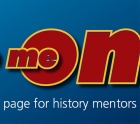Inclusion
The literacy demands inherent in history, given the nature of much of its basic source material and the predominant methods by which historical knowledge is disseminated and assessed, undoubtedly make issues of access for all learners very challenging indeed. Yet the role of history in equipping young people to make sense of the world in which they live mean that this is a challenge that teachers cannot afford to duck. Read more
-

Move Me On 149: how to provide appropriate support for particular students
ArticleClick to view -

Witchcraft - Using fiction with Year 8s
ArticleClick to view -

Northamptonshire in a Global Context
ArticleClick to view -

Helping pupils with Special Educational Needs to develop a lifelong curiosity for the past
ArticleClick to view -

Vive la France! A comparison of French and British history teaching, with practical suggestions from across La Manche
ArticleClick to view -

Uncovering the hidden histories: black and Asian people in the two world wars
ArticleClick to view -

Move Me On 119: Teaching EAL students
ArticleClick to view -

Does differentiation have to mean different?
ArticleClick to view -

'Britain was our home': Helping Years 9, 10, and 11 to understand the black experience of the Second World War
ArticleClick to view -

Thinking from the inside: je suis le roi
ArticleClick to view -

Ordinary pupils, extraordinary results: a structured approach to raising attainment at GCSE
ArticleClick to view -

And Joe arrives...: stretching the very able pupil in the mixed ability classroom
ArticleClick to view

